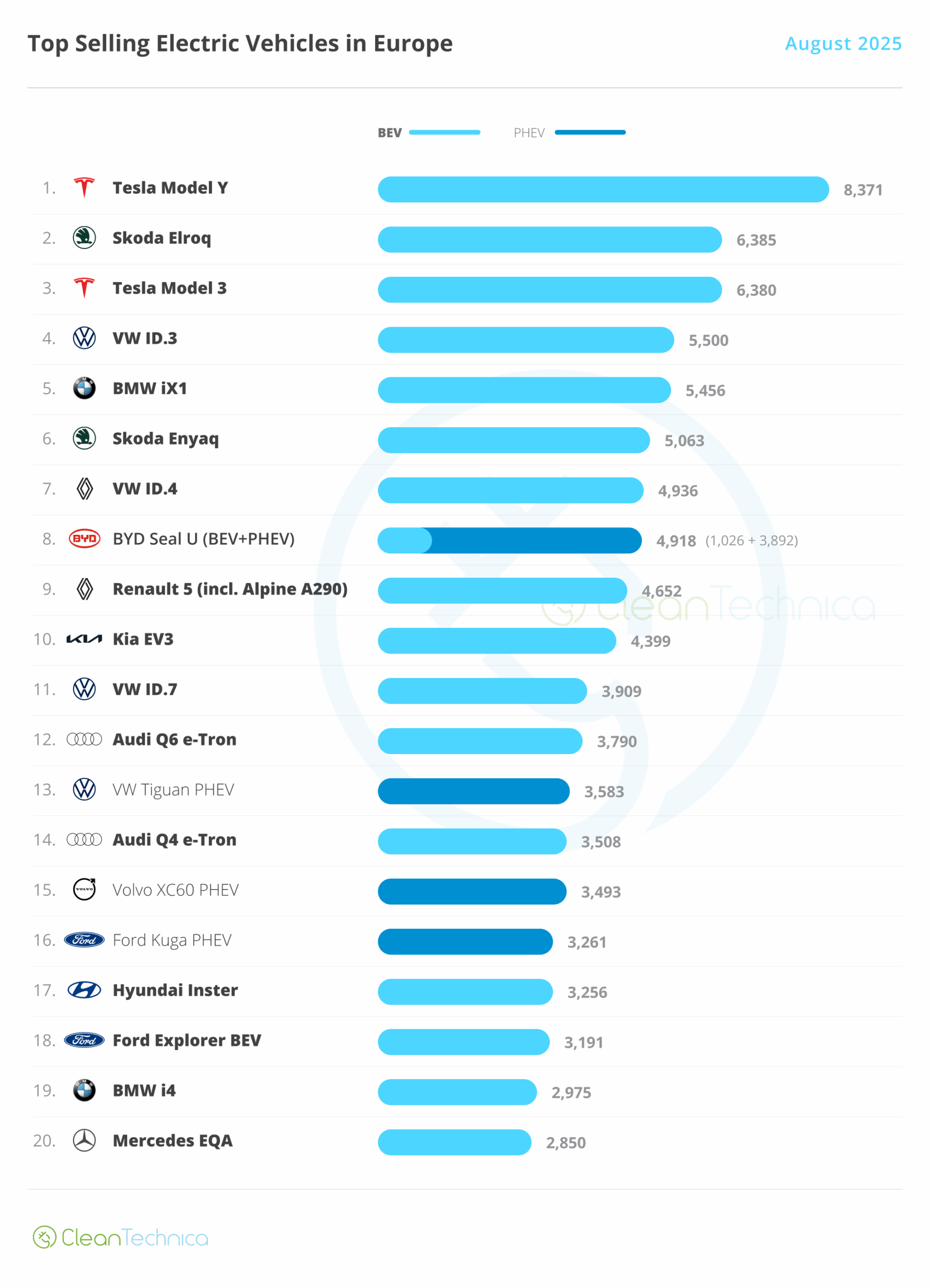Sign up for daily news updates from CleanTechnica on email. Or follow us on Google News!
BYD is knocking the ball out of the park every month. In August, it delivered 370,854 vehicles, up nearly 30% compared to August of 2023. There are some interesting statistics within that number. New energy vehicles, which in China include both battery-electric and plug-in hybrid cars, totaled 366,973. Of those, 146,690 were battery-electric cars, down nearly 10,000 from last year. But plug-in hybrids surged to 218,054, up 90,000 from a year ago and accounting for nearly two-thirds of all new car sales by BYD, which is based in Shenzen, China. CNBC says that if BYD keeps up its average monthly overseas sales pace through the end of December, the company will sell just under 400,000 cars outside China this year,
According to Car News China, Yiche recently compiled a Top 40 list for the bestselling domestic cars in the nation. It shows that sales of new energy cars accounted for 54% of all new car sales in China, but what really stood out was the BYD models like the Seagull, Qin Plus, Song Plus, Qin L, Seal 06, and Atto 3 accounted for the top 6 slots on the list. In all, BYD vehicles captured 12 of the top 20 positions.
Perhaps even more insightful, Car News China says, is that the sales numbers show that a number of producers are struggling to find models that sell well, including many of the traditional Chinese companies. Only Changan, GAC (Aion), and FAW (Hongqi) are enjoying sales success. One of the more dynamic private companies, Great Wall, does not have a single entry on the Top 40 lists until 36th place, which is held by the Havel Big Dog. Geely, although not in as good of a position as BYD, did markedly better than Great Wall. Newcomers Xiaomi managed to clinch 21st place with its SU7, while Huawei-backed Aito gained the 14th position for the M9 and 28th spot for the M7.
CNBC reports that among other Chinese car companies, Nio delivered 20,176 cars in August, down slightly from July but above 20,000 for a fourth straight month. The company’s lower-priced brand Onvo opened 105 stores on Sunday as the company prepares to begin for deliveries of the L60 SUV, its first car, this month. Xpeng reported 14,036 cars were delivered in August, its best month of the year so far. The company said on Friday it began some deliveries of its newly launched mass market Mona M03 electric car that sells for the equivalent of less than $20,000 in China.
Zeekr, one of many brands owned by Geely, reported an increase in sales to 18,015 in August. That was more than in July but down from 20,206 deliveries in June. The company said it would launch its first SUV this month with a price more than $1,400 lower than the Tesla Model Y. The company said it expects to deliver the SUV globally by the end of this year, but did not say specifically in which countries or regions. There is some question whether a difference of $1400 will be enough of a discount to peel a significant number of customers away from Tesla.
Upstart Xiaomi, best known for its cellphones, said it delivered more than 10,000 cars in August for a third straight month. In July, CEO Lei Jun said the company aimed to deliver 100,000 units of its SU7 electric sedan by the end of November, which means it needs to deliver an average of 16,000 cars a month from August to November, according to CNBC. The company began deliveries of the SU7 in April at a price about $4,000 less than a Tesla Model 3
Chinese Cash For Clunkers Kicks In, Boosts BYD
In July, China introduced a new cash for clunkers campaign designed to get some of its older high-polluting cars off the road. The new program doubles the trade-in subsidies first introduced in April as part of an attempt to boost demand for cars after sales growth slowed in the first half of the year. China’s cash for clunkers trade-in program could increase consumer demand for EVs in the coming months, driving total electric car sales to more than 10 million this year, according to BloombergNEF.
BYD, with its emphasis on new energy vehicles, stands to be helped by the new trade-in program. The incentive is now 20,000 yuan ($2,760). Customers can also qualify for 15,000 yuan ($2,100) toward the purchase of a more fuel efficient gasoline-powered car. Many Chinese cities have followed suit, offering additional incentives ranging from around $140 to $1,400 per vehicle.
Apparently, Chinese car buyers are not that interested in purchasing a new gasoline-powered car. Passenger vehicle sales in China fell in August for the fifth straight month, though sales of all-electric and plug-in hybrid models rose, helped by those new subsidies. Reuters reports that total sales fell 1.1% from the same month a year earlier to 1.92 million vehicles, according to data from the China Passenger Car Association. That came on top of a 3% decline in July.
However, sales of new energy vehicles surged by 43% to account for a record 53.5% of total car sales. Both BYD and Tesla had their best sales month of 2024. Car exports increased 24% following a 20% rise in July. The numbers reflected waning consumer confidence, Reuters says, with first time car purchases lagging behind trade-ins. “Over 80% of the applicants for trade-in subsidies opted to buy NEVs,” CPCA secretary general Cui Dongshu said.
Rising EV and plug-in hybrid sales have barely helped with challenges at dealerships that are battling price falls. More than half of the dealerships in China suffered a loss in the first six months of 2024, data from the China Automobile Dealers Association showed. China Grand Automotive Services, the second largest dealership group in China, was de-listed from the Shanghai stock exchange in August after its stock traded below par value for 20 consecutive days.
Sales of plug-in hybrids, especially so called extended range hybrids that have larger batteries than traditional plug-in cars, are expanding rapidly in China. BYD has one new model it says can travel a bladder-busting 1250 miles without stopping for gasoline or recharging the battery. We can debate whether a plug-in car is a “real” EV, but Chinese customers are snapping them up like corn dogs at the state fair. That could be a problem for Tesla down the road, as it manufactures no plug-in hybrid vehicles. That’s a trend that bears watching.

Have a tip for CleanTechnica? Want to advertise? Want to suggest a guest for our CleanTech Talk podcast? Contact us here.
Latest CleanTechnica.TV Videos
CleanTechnica uses affiliate links. See our policy here.
CleanTechnica’s Comment Policy





